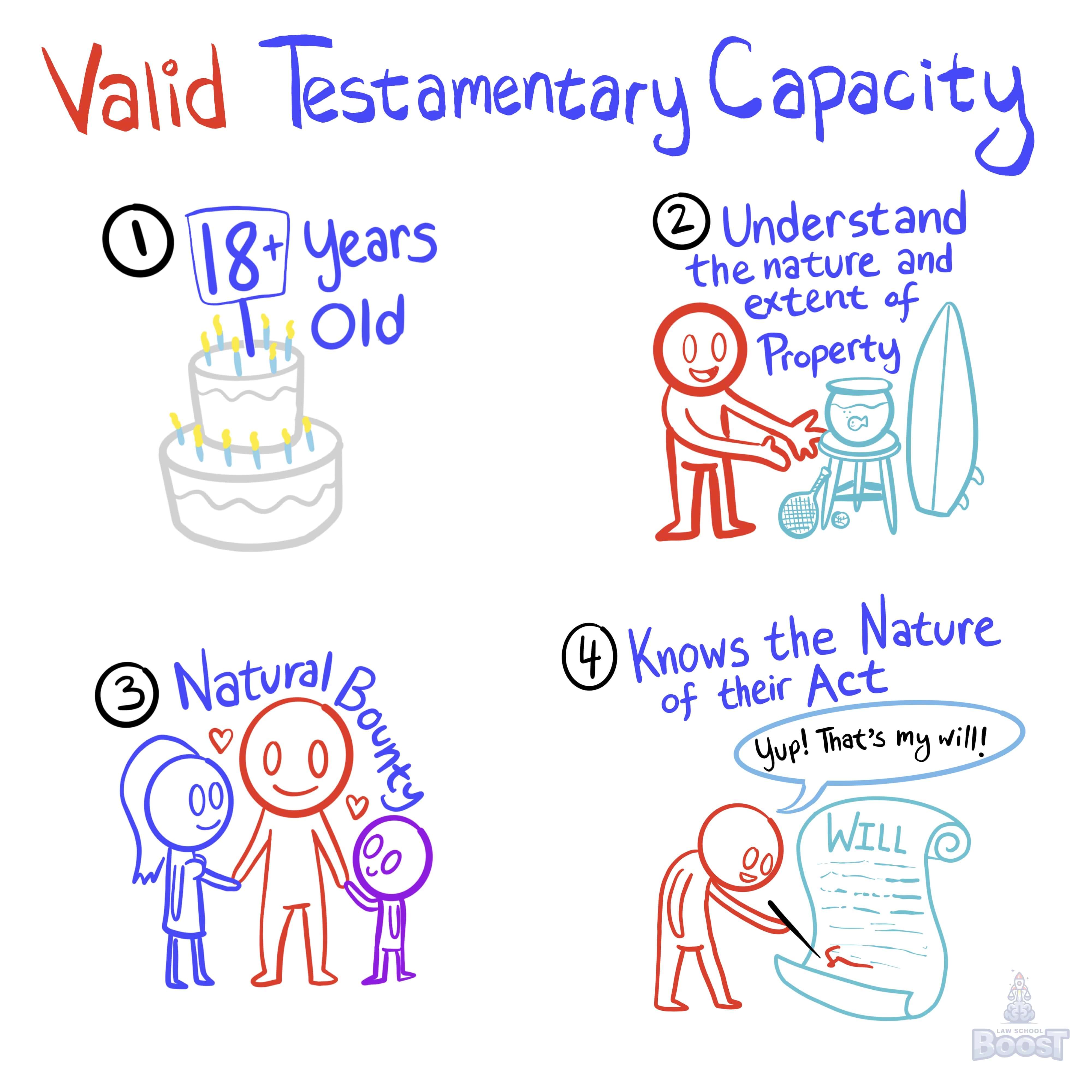😭
Wills • Capacity
WILLS#009
Legal Definition
To have valid testamentary capacity, one must (1) be 18 years old, (2) understand the extent of their property, (3) know the natural object of their bounty, and (4) know the nature of their act.
Plain English Explanation
A "testament" is another word for a will. Thus, "testamentary capacity" means someone who creates a testament had the capacity (or legal ability) to do so. To have valid testamentary capacity, a person must (1) be an adult; (2) be aware of the stuff that they own and possess; (3) be aware of their family and anyone affected by their will; and (4) be aware that they are executing a will at the time they execute the will (i.e., if they are confused as to what they are signing when they sign the will, then it doesn't count).
Hypothetical
Hypo 1: Sam is 25 years old, well aware of his assets, and has a good relationship with his family. He decides to create a will but at the time of signing, he is heavily medicated and doesn’t realize what he is signing. Result: Sam lacks valid testamentary capacity because he fails to meet condition (4), understanding the nature of his act while executing the will.
Hypo 2: Bob is 45 years old and wants to write a will. However, he has a strained relationship with his family and has no idea who would be the natural recipients of his assets should he pass away. Result: Bob lacks valid testamentary capacity as he fails to meet condition (3), knowing the natural object of his bounty.
Hypo 3: Sam is 17 years old, with a clear understanding of his assets, his family, and the nature of creating a will. He decides to draft a will. Result: Sam lacks valid testamentary capacity as he fails to meet condition (1), being 18 years old.
Hypo 4: Bob and Sam are business partners. Bob wants to create a contract where Sam agrees to buy Bob's share of the business if Bob dies. They are both well aware of their assets and the nature of the contract. Result: The rule of valid testamentary capacity does not apply here as this situation involves a business contract, not the creation of a will.
Hypo 2: Bob is 45 years old and wants to write a will. However, he has a strained relationship with his family and has no idea who would be the natural recipients of his assets should he pass away. Result: Bob lacks valid testamentary capacity as he fails to meet condition (3), knowing the natural object of his bounty.
Hypo 3: Sam is 17 years old, with a clear understanding of his assets, his family, and the nature of creating a will. He decides to draft a will. Result: Sam lacks valid testamentary capacity as he fails to meet condition (1), being 18 years old.
Hypo 4: Bob and Sam are business partners. Bob wants to create a contract where Sam agrees to buy Bob's share of the business if Bob dies. They are both well aware of their assets and the nature of the contract. Result: The rule of valid testamentary capacity does not apply here as this situation involves a business contract, not the creation of a will.
Visual Aids

Related Concepts
How do you make a prima facie case for undue influence?
In California, can an attorney who drafts a will for their client be a beneficiary?
In California, when is there a statutory presumption of undue influence?
In California, when is there no presumption of undue influence for a donative transfer?
What happens if someone fraudulently prevents someone from creating a will?
What is an insane delusion?
What is fraud in the execution?
What is fraud in the inducement?
What is required to establish fraud?
What is undue influence?
What relief is available if mistake in the inducement occurs?
When assessing undue influence, what is the presumption test?
When does a mistake in the execution occur and what is the result?


